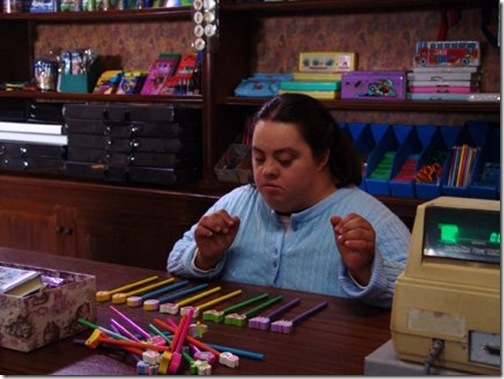How’s this for a premise: When a terrorist attack separates a Down syndrome-suffering woman from her caring and infinitely patient mother for the first time in her life, she is forced to confront a harsh outside world, emotionally connecting with the derelicts she encounters and vice versa.
Healthy and full of real-world nutrients, Anita is the kind of film that’s more good for you than entertaining – the cinematic equivalent of, to paraphrase President Obama, “eating our peas.” It’s more precious than Precious, but it charts a similar terrain, rubbing our noses in the misfortunes of a helpless minority and hoping its melodrama can finally Make a Difference.
The setting is Buenos Aires, 1994, and the real-life bombing of the Argentine Israelite Mutual Association building (AMIA, in Spanish), which took the lives of 85 people and injured hundreds more. Dramatized with immediacy and without frills, the explosion rocks the mentally impaired Anita (Alejandra Manzo) off the ladder of her mother’s business. Mom, played by the wonderful Oscar nominee Norma Aleandro, is nowhere to be found, having left for a brief visit to the AMIA. Anita is stranded amid the rubble with no comprehension of what just happened.
Non-practicing in their beliefs, the Jewishness of Anita’s family is beside the point – they are collateral damage from a politically motivated Hezbollah militia. Nonetheless, Anita has been a showcase film at a number of Jewish film festivals worldwide, including the Palm Beach Jewish Film Festival last December. But despite the angry and thoughtful quotation that concludes the movie, the political implications of Anita’s inciting incident are unexplored.
The only information about the bombing arrives in half-absorbed TV news reports. Argentine co-writer/director Marcos Carnevale, who previously gave us the senior citizen romance Elsa and Fred, instead focuses on the human element, rotating the narrative between Anita’s struggle to survive and her brother Ariel’s (Peto Menahem) attempts to find Anita and their mother.
Anita’s journey is portrayed, for the most part, with admirable naturalism, as she relies on the charity of a number of reluctant strangers, including alcoholic deadbeat dad Felix (Luis Loque), a family of squabbling Chinese shop owners and an abrasive nurse with a heart of gold (Leonor Manso). But Carnevale has a tendency to overplay his hand, layering a pretty but emotionally suffocating score over scenes that have enough power to move us on their own.
His attempt to stylize the aftermath of the sobering bombing with sentimental slow-motion comes off as tacky, creating a scene of choreographed carnage in an otherwise straightforward presentation. And a few lines of dialogue come off as phony bits of trailer bait: “You fell down the ladder, and my life fell into pieces,” observes the bedraggled Felix, in a laughably insightful moment of dimestore Zen.
Yet Anita is worth seeing, if only for the remarkable “performance” of Manzo as the title character. Carnevale’s decision to cast an actual Down sufferer in the central role gives the film its strongest credibility. The puffy, glassy-eyed actress is a heartbreaking cipher — oblivious, confused and alone in this once-in-a-lifetime part.
She brings the kind of conviction that can’t be acted, only conveyed through learned experience. Where a professional actor might use a role like this to angle for an Oscar, Manzo performs without an iota of self-consciousness, becoming the documentary center of Carnevale’s well-intentioned fiction.
This film is certainly a plate full of cold vegetables, but sometimes I really like peas.
ANITA. Directed by Marcos Carnevale. Cast: Alejandra Manzo, Norma Aleandro, Peto Menahem, Luis Loque, Leonor Manso. Distributor: Menemsha. In Spanish with English subtitles. Opens: Friday at Living Room Theaters at FAU.
